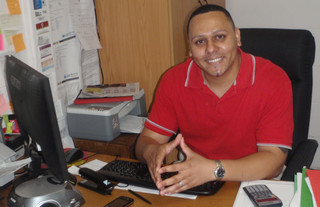
Thousands of Grahamstownians are expected to join hands, to reflect on the legacy of late former statesman Nelson Rholihlahla Mandela and bridge the class and race divide that is prevalent in Grahamstown through the Human Chain event on 21 February 2014.
About 5000 residents are expected to participate in the first event of its kind in the province, which will see them forming a human chain through the city, connecting residents from Ncame Street in Joza location to Somerset Street in town.
Mr Roger Domingo, co-organiser and director of GADRA Advice in Grahamstown said that while Grahamstown residents are often separated by location, the chain affords them the opportunity to bridge the divides that still exist in the city.
With some of the highest levels of poverty and unemployment in South Africa, many residents continue to live very isolated lives, often disconnected from the daily realities of others’ lives some five kilometres away.
“We continue to live in very divided societies where past divides and great inequality exist, but these are the things Madiba fought against and we should be conscious of this. We can still come together and be united and keep striving towards those values of an equal society,” he said.
“Regardless of location, we will be linked as a city. Whether you’re holding hands up in Joza or in High Street you’ll still be linked with people all over the city. This chain will pass through three areas and through past divides and can serve as a symbol of integration,” he said.
The event affords the opportunity to meaningfully reflect on the state of contemporary South African society and how the values of democracy, non-racialism and equality exemplified by Mandela can be revived.
Co-organiser and director of Community Engagement at Rhodes University, Ms Diana Hornby said, “Madiba brought a divided people into a nation and if he and our future means anything to us we should reflect on how we move forward. One way is to move forward in the Human Chain way, acknowledging our role in building and shaping a new and just society in Grahamstown.”
“Many events and festivals come to town and yet with many of these there is still a sense of disunity. People don’t actually come together. I think the fact that this event is non-political, is not aligned to any particular institution or organisation, and is a Grahamstown-led event plays an important part in really getting people to join forces and reflect on where we are as a country 20 years into democracy, where we want to go and how the values of Madiba can help with this,” said Mr Domingo.
Initially conceived of by Archbishop Thabo Makgoba of the Anglican Church, the first Human Chain event was hosted on 18 July 2013 in Cape Town and saw over 5000 Capetonians join forces representing a range of churches, synagogues, civil society organisations and media houses.
Mr Domingo said the Local Organising Committee, comprising various Grahamstown-based institutions and organisations that has been planning the event since 2013, was inspired by the initial event and has added to the idea by planning a range of cultural activities on the day to be hosted at various Living Legacy sites around the city, including Joza Youth Hub and the Drostdy lawns.
He said local artists, poets, dancers and performers have been invited to participate on the day.
Ms Hornby added that Grahamstown is blessed with some “extraordinary visionaries who are already hard at work in a number of sectors, contributing very strategically. There is a growing belief that it is very possible to turn Grahamstown around and we know this event will strengthen this citizens movement and give it more impetus.”
Ms Hornby said the event provides a space for residents, learners and students to collectively commemorate Mandela’s death and celebrate his life.
By Sarah-Jane Bradfield
